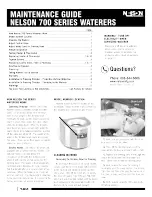
46
En
Appendix
12
Appendix
Troubleshooting
If the following error codes appear on the screen, check the corresponding items in the table.
Problem
Possible Solution
• No power.
• The system cannot be switched on.
• Make sure that the Plasma Display and the Media Receiver are connected correctly.
(See page 17.)
• Is the power cord disconnected? (See page 20.)
• Has the main power been turned on? (See pages 21 and 22.)
• Check if you pressed buttons
0 – 9
on the remote control unit. (See page 21.)
• If the indicator on the system lights up red, press
0 – 9
.
• Blue and red rectangles appear on
the screen alternately.
• Check if the system cable has been disconnected or almost disconnected. (See page 17.)
• The system cannot be operated.
• External influences such as lightning, static electricity, etc., may cause improper operation.
In this case, operate the system after first turning off the power of the Plasma Display and the Media
Receiver, or unplugging the power cord and re-plugging it in after 1 or 2 minutes.
• Remote control unit does not operate.
• Are batteries inserted with polarity (+, –) aligned? (See page 19.)
• Are batteries worn out? Replace with new batteries. (See page 19.)
• Operate the remote control unit while pointing it toward the remote control sensor on the Plasma Display.
(See page 19.)
• Are you using it under strong or fluorescent lighting?
• Is a fluorescent light illuminated to remote control sensor?
• No image and audio is presented.
• Check if the input source for video has been unintentionally selected although you want to watch a TV
channel. (See page 22.)
• Check if you have selected a channel blocked with Child Lock. (See page 28.)
• Enter a password to temporarily cancel Child Lock. (See page 38.)
• Check the cable connection with the antenna. (See page 20.)
• Check the cable connection with the other equipment. (See pages 40 to 43.)
• No picture.
• Is connection to other components correct? (See pages 40 to 43.)
• Is the Input Select setting correct? (See page 36.)
• Audio is output but no image is
presented.
• Check if you have selected “Picture Off” for Energy Save. With this option selected, the screen is deactivated:
only sound is output. To restore the screen display, press any button other than
i
+/
i
– or
e
(See page 35).
• Images are presented but no audio is
output.
• Check if you have selected the minimum volume. (See page 23.)
• Check if you have muted sound. (See page 23.)
• When using INPUT 4 as the input source, check that the audio terminal is also in connection.
(See page 43.)
• Sound is reversed between the right
and left.
• Sound is output from only a single
speaker.
• Check if the speaker cable connections have been reversed between the right and left or if the speaker cable
from either speaker has been disconnected. (See pages 12 and 18.)
• Has the balance been correctly adjusted? (See page 34.)
• Picture is cut off.
• Is the image position correct? (See page 36.)
• Has the correct screen size been selected? (See pages 37.)
• Strange colour, light colour, dark or
colour misalignment.
• Adjust the picture tone. (See pages 31 to 33.)
• Is the room too bright? The picture may look dark in a room that is too bright.
• Check the colour system setting. (See pages 28 and 36.)
• Power is suddenly turned off.
• The system’s internal temperature has increased. Remove any objects blocking vent or clean.
(See page 15.)
• Check the power control setting. (See page 35.)
• Check the sleep timer setting. (See page 38.)
• Panel sounds /noises
• Panel generated sounds,examples:Fan motor noise,Electrical Circuit Humming /Glass Panel buzzing are
normal operation of a phosphor-based matrix display.
Code
Message
Check
SD04
Powering off. Internal temperature too high.
Check temperature around PDP.
Check if the ambient temperature of the Plasma Display is high.
SD05
Powering off. Internal protection circuits activated.
Is there a short in speaker cable?
Check the speaker cable connections between the Plasma Display and the
speakers.
SD11
Powering off. Internal temperature too high.
Check the temperature around media receiver.
Check if the ambient temperature of the Media Receiver is high.
PDP-506FDE.book Page 46 Wednesday, June 29, 2005 4:00 PM
















































